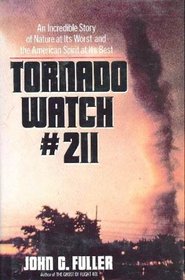True stories of the upper midwest tornado outbreak in May of 1985. Great stories of survival and overcoming tragedy.
Search -
Tornado Watch Number 211
Tornado Watch Number 211
Author:
Two years ago, on Friday, May 31, 1985, weather forecaster Steve Weiss was sitting at his desk inside the horseshoe formed by flickering computer terminals and radar screens at the National Severe Storms Forecast Center in Kansas City, Missouri. Meteorologists like Weiss are called "keepers of the gates of hell." They track mainly gale... more »
Author:
Two years ago, on Friday, May 31, 1985, weather forecaster Steve Weiss was sitting at his desk inside the horseshoe formed by flickering computer terminals and radar screens at the National Severe Storms Forecast Center in Kansas City, Missouri. Meteorologists like Weiss are called "keepers of the gates of hell." They track mainly gale... more »
ISBN-13: 9780688065904
ISBN-10: 0688065902
Publication Date: 9/1987
Pages: 202
Edition: 1st ed
Rating: 1
ISBN-10: 0688065902
Publication Date: 9/1987
Pages: 202
Edition: 1st ed
Rating: 1
3.5 stars, based on 1 rating
Publisher: William Morrow and Company, Inc.
Book Type: Hardcover
Members Wishing: 1
Reviews: Member | Amazon | Write a Review
Book Type: Hardcover
Members Wishing: 1
Reviews: Member | Amazon | Write a Review
Please Log in to Rate these Book Reviews
Genres:
- Nonfiction >> Current Events >> Poverty >> Social Services & Welfare
- Science & Math >> Physics >> General
- Science & Math >> Earth Sciences >> Tornadoes
- Outdoors & Nature >> Reference




